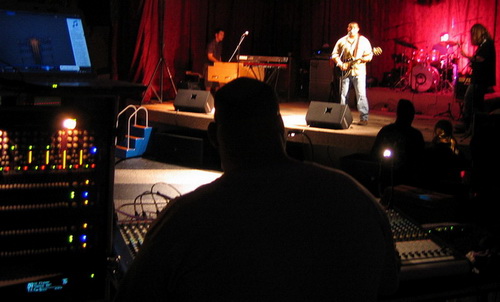| « It's a Wonder it Took So Long | Sympathy for the Devil » |
Sound Advice - Part 2- Live Sound Tips
Recently I wrote the first part in this mini-series about getting decent sound from a third-party sound crew. In Part 2 I’ll show that, in my experience, the way to have the best sound at the lowest volume is to let the sound guy control the mix.
If you can’t hear yourself on stage, that is a monitor problem, not an amp volume problem
Get his attention and say this, “I can’t hear my guitar. Should I turn my amp up or can you give me more monitor please?” You’ll likely get more monitor. If he tells you to turn your amp down, it is so you will appear to come out of both sides of the sound system, rather than heavy on the side where your amp is. This lets you blend in better with the entire band as you would on a CD. The house sound needs to be balanced so that the song sounds pretty much the same from all sides of the house.
The next time you find yourself reaching for the volume knob on your amp mid-performance, STOP! Ask the sound guy for more monitor instead. There is no way for him to make you sound good if he does not have control. He (not you) sets you in the mix, EQs you for the room and drops you into the sonic landscape like the little flower that you are.
Find out your channel on the mixer
When you need more sound or the sound guy forgets where you are, you can then say, “More monitor on Number 8, please.” Make it easy for him to help you.
When you are asked to check a vocal mic, don’t just say check-check and then stop.
That is really frustrating! A sound guy needs you to keep singing, or at least talking, until he tells you to quit.
The sound check is not to see if the mics are on, it is to set the balance of the volume and the tone of your sound. If it is a “live” sound check, you should involve the audience into the mix.
This is a great time to talk to your audience and draw them in. Tell them who you are, who the other players are. Get a round of applause for the band that came before you or pimp the house special. “How about this room, fantastic aint it? The beer is cold and the well drinks are 3 bucks! Those pretty girls over there are buying their own drinks, you fools!” Make ‘em thirsty.
Selling from the stage for the venue is a really good way to get asked back. Anything is better than “testing-testing-1-2-3.” I have a song that I use over and over for sound checks. It is loud, it is in my normal range and I can sing it without music.
I also use the same song with my 12-string for sound checks. After playing the guitar a little bit, I will sing while playing so that the two can be mixed together. Just remember to communicate if you need more monitor, more bass or whatever to produce your unique sound, but be nice about it.
Don’t move the mics out of position
Most sound crews have a system of numbering the tracks and mics onstage to make it easy to visually mix the sound. When you move them all over the place, wires get crossed and numbers get out of order. If you have to move a mic stand, move it toward the back of the stage behind you, not side to side. If you have to change mics, you must make sure it is going to be on and mixed for your voice or amp.
Obviously, a good sound guy will track your movements and follow you, but keep in mind that it is your responsibility to make sure the sound guy is aware that you’re switching mics. A good sound crew drops unused mics out of the mix.
The sound guy knows where the mic you are using is plugged in and that it is mixed for your sound. If it fails, he should be ready to bring up and remix any mic you grab, but don’t just willy-nilly switch mics in the middle of a song and expect to sound good.
There is nothing more annoying than a buzz coming from an amp
If your system has a buzz, there is something wrong. Fix it. Don’t count on the volume of your rock to cover it up. In between each sound will be your irritating hum. Clean up your act or the sound guy will have to, by cutting the frequencies of your obnoxious buzz to lessen its annoyance. This will also affect the sound of your screaming solo which will now have a flat top and no peaks in the wave form. That is almost as annoying as the hum.
Check your cables before you leave your house
I shouldn’t have to say this. I really shouldn’t have to say this, but I will. Test out your cables before you leave your house. Make sure that you bring enough patch cables. Also, be sure to bring a standard orange extension cord for your pedals or amp.
Listen to the sound guy and watch how the audience reacts. Are they tappin’ their feet in time? Are they looking at your soloist? It is cool to ask once if they can hear you ok but don’t harp on it. By the third song, any decent sound crew will have you sounding as good as you are going to sound.
Concentrate on your set and let the sound crew do their jobs
Stay out of the way and don’t tangle the cables. Treat the sound guy with the respect he deserves, cooperate and trust him to do his job. Offer suggestions if you want a particular sound, but don’t be demanding. Say please and thank you. Buy the guy a beer. He is working the whole time he is there.
When you act like a professional, you get treated like one
Being a professional means going with the flow, following the venue protocols and being thoroughly prepared so that no matter what happens, you can get through your set sounding and looking good.
Make friends with the sound crew
They are the people that make you sound good. They also know the owner or promoter and every other band in town. They will get to know how good you are and if you are a diva or a professional. If an owner asks him what he thinks about your band, you do not want him saying “Those guys? They are a pain in the ass.” You want him to say “They made it easy.” You want him bragging about you and the sound you made together to all his friends.
I really have learned a lot about sound over the years. That weekend I got back to the basics and revisited simple sound. It was refreshing not to feed a generator, run miles of cable and hang tons of speakers. Being the sound guy helped me realize what a jerk I can be on stage. I have a fresh understanding of what it takes to make us sound good on stage and I won’t be putting up any fights next time. Rather, I’ll let the sound techs take control.
Trusting someone with your sound should be easier, but it isn’t. Practice it like you do your guitar. It will make you a better entertainer and that, my friend, will make them want you back.




